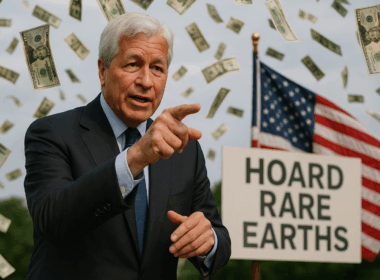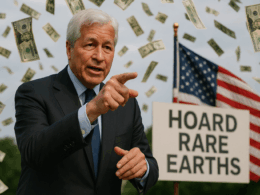“Be fearful when others are greedy, and be greedy when others are fearful.”
Yes, I know, you have heard that phrase a million times over. And yes, I know, it is a phrase coined by one of the most successful – no – THEE most successful investor of all time: Mr. Warren Buffett
As a kid growing up that phrase has always echoed in my head. So has the Oracle of Omaha. There is no doubt that he is the best and why so many investors think of him when they think of successful investors.
So why are we not all rich and successful like him? You would assume that if we think of him as “the best of the best”, we should all follow his advice. We should all invest in what he invests in. But we haven’t.
Why? Because we’re not like him.
He is old. He is traditional. He is the past.
We are the new age investors. We are the investors who are shaping and changing our future. We are the investors who promote change and aggressive progress in order to become the best. We want to improve our technologies and explore the unexplored. We are the next generation.
Mr. Warren Buffett, you are old.
We are much more complex than you.
THAT is our problem.
In our quest to move forward, we have forgotten the single most important rule that can be applied to practically every situation: KISS (Keep It Simple Stupid)
Throughout Mr. Buffett’s career, he has always had a very few simple rules of investing that has taken him to where he is today, one of the richest men in the world. I encourage everyone to read his works (such as “The Essays of Warren Buffett : Lessons for Corporate America” and “The Intelligent Investor”) and you will see (and agree) with me that his mantra all equates to simplicity.
There are arguments that he could have invested in some of the tech companies during the boom and potentially made millions more than he already has. But guess what? He is still on top.
It’s scary to see how accurately Mr. Buffett has predicted the outcome of our historical financial events. Back in 1999, when the tech boom was booming, he wrote yet another rare article, which you should all read here: http://money.cnn.com/magazines/fortune/fortune_archive/1999/11/22/269071/index.htm
In that article, he says:
“Let’s start by defining “investing.” The definition is simple but often forgotten: Investing is laying out money now to get more money back in the future–more money in real terms, after taking inflation into account.
He goes on to discuss the auto industry and how only 3 automakers of a potential 2000, came out on top. Then he discusses airlines, “another industry whose plainly brilliant future would have caused investors to salivate.”Yet very few of them are still left today – and making any money.
He makes a comment that strikes a profound note by saying, “The key to investing is not assessing how much an industry is going to affect society, or how much it will grow, but rather determining the competitive advantage of any given company and, above all, the durability of that advantage. The products or services that have wide, sustainable moats around them are the ones that deliver rewards to investors.”
And boy was he right.
Applying that to the dot.com explosion (discussed here: http://equedia.com/blog/view.php/Financial-Crisis-Not-So-Bad), and Mr. Buffett was right – again. How many companies of the tech boom came out alive? Yes, there are your Googles, Amazons and Ebays but much more failed than those who succeeded.
Simplicity wins again.
I think it’s about time to listen to his advice.
Buy Warren Buffett. I am.
________________________________________________________________________________________
Below, I have pasted Mr. Buffett’s recent article (October 16, 2008), “Buy American. I Am.”
You can find the article link here:
http://www.nytimes.com/2008/10/17/opinion/17buffett.html?_r=1&partner=rssuserland&emc=rss&pagewanted=all&oref=slogin
“Buy American. I Am.”
By Warren Buffett, Published: October 16, 2008
THE financial world is a mess, both in the United States and abroad. Its problems, moreover, have been leaking into the general economy, and the leaks are now turning into a gusher. In the near term, unemployment will rise, business activity will falter and headlines will continue to be scary.
So … I’ve been buying American stocks. This is my personal account I’m talking about, in which I previously owned nothing but United States government bonds. (This description leaves aside my Berkshire Hathaway holdings, which are all committed to philanthropy.) If prices keep looking attractive, my non-Berkshire net worth will soon be 100 percent in United States equities.
Why?
A simple rule dictates my buying: Be fearful when others are greedy, and be greedy when others are fearful. And most certainly, fear is now widespread, gripping even seasoned investors. To be sure, investors are right to be wary of highly leveraged entities or businesses in weak competitive positions. But fears regarding the long-term prosperity of the nation’s many sound companies make no sense. These businesses will indeed suffer earnings hiccups, as they always have. But most major companies will be setting new profit records 5, 10 and 20 years from now.
Let me be clear on one point: I can’t predict the short-term movements of the stock market. I haven’t the faintest idea as to whether stocks will be higher or lower a month — or a year — from now. What is likely, however, is that the market will move higher, perhaps substantially so, well before either sentiment or the economy turns up. So if you wait for the robins, spring will be over.
A little history here: During the Depression, the Dow hit its low, 41, on July 8, 1932. Economic conditions, though, kept deteriorating until Franklin D. Roosevelt took office in March 1933. By that time, the market had already advanced 30 percent. Or think back to the early days of World War II, when things were going badly for the United States in Europe and the Pacific. The market hit bottom in April 1942, well before Allied fortunes turned. Again, in the early 1980s, the time to buy stocks was when inflation raged and the economy was in the tank. In short, bad news is an investor’s best friend. It lets you buy a slice of America’s future at a marked-down price.
Over the long term, the stock market news will be good. In the 20th century, the United States endured two world wars and other traumatic and expensive military conflicts; the Depression; a dozen or so recessions and financial panics; oil shocks; a flu epidemic; and the resignation of a disgraced president. Yet the Dow rose from 66 to 11,497.
You might think it would have been impossible for an investor to lose money during a century marked by such an extraordinary gain. But some investors did. The hapless ones bought stocks only when they felt comfort in doing so and then proceeded to sell when the headlines made them queasy.
Today people who hold cash equivalents feel comfortable. They shouldn’t. They have opted for a terrible long-term asset, one that pays virtually nothing and is certain to depreciate in value. Indeed, the policies that government will follow in its efforts to alleviate the current crisis will probably prove inflationary and therefore accelerate declines in the real value of cash accounts.
Equities will almost certainly outperform cash over the next decade, probably by a substantial degree. Those investors who cling now to cash are betting they can efficiently time their move away from it later. In waiting for the comfort of good news, they are ignoring Wayne Gretzky’s advice: “I skate to where the puck is going to be, not to where it has been.”
I don’t like to opine on the stock market, and again I emphasize that I have no idea what the market will do in the short term. Nevertheless, I’ll follow the lead of a restaurant that opened in an empty bank building and then advertised: “Put your mouth where your money was.” Today my money and my mouth both say equities.












